Alessia Cara Wants To Heal Herself, And Everyone Else
'The Pains of Growing' is the most personal release from the singer to date.
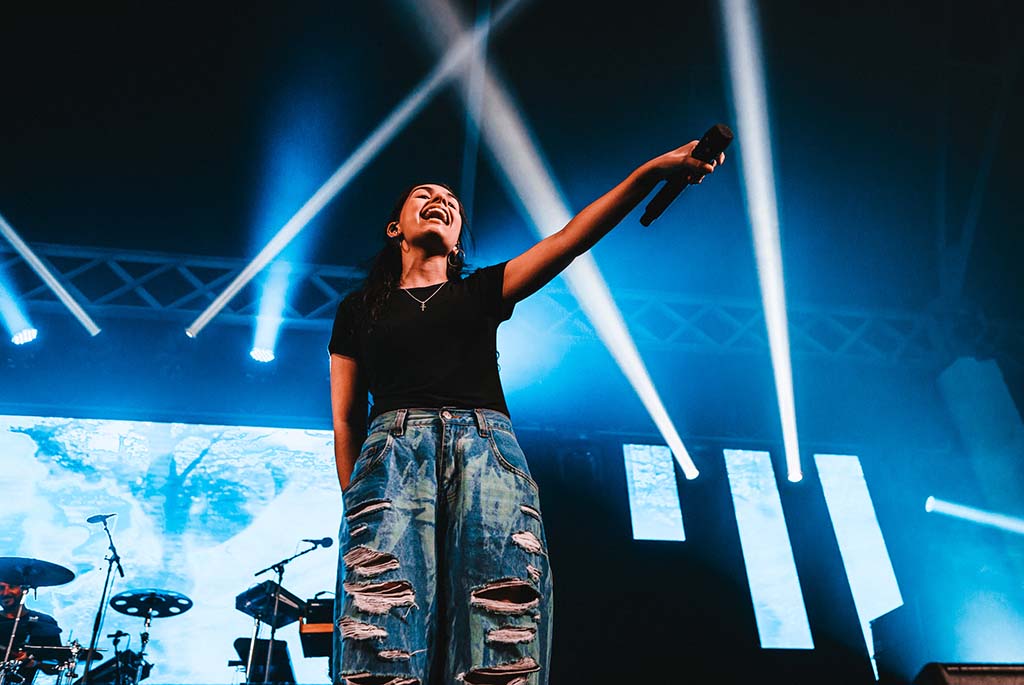

Optus Music gets you closer to the artists you love.
There’s a line on Alessia Cara’s thundering new single ‘Growing Pains’ that hits a little harder than most.
“I take on the stress of the mess that I’ve made,” she sings over the thudding synths. “Don’t know if I even care for ‘grown’…If it’s just alone.”
It’s a starkly personal revelation from the young Canadian singer, who first burst into the spotlight on the 2015 track ‘Here’ and the subsequent (and wildly successful) record Know-It-All.
But it’s also not an unexpected one: Cara’s life was completely turned upside down by the success of Know-It-All, and the impact the record – and everything that comes along with it – has had on the singer’s personal life is not insignificant.
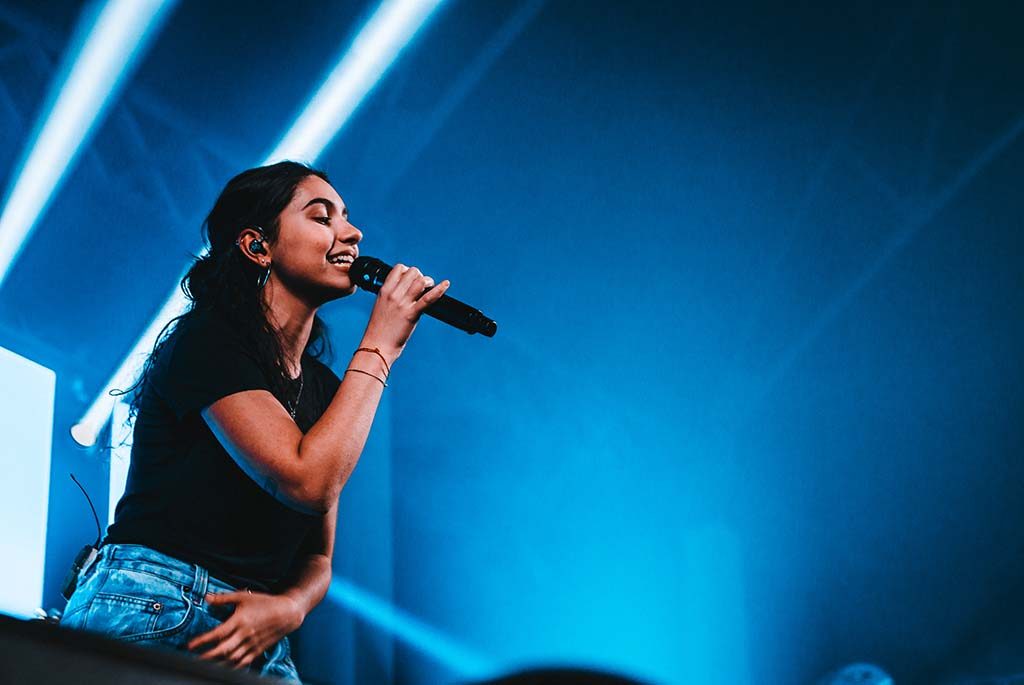
Image: Jess Gleeson
Her upcoming album, titled The Pains of Growing, sees Cara working through all of those messy thoughts and feelings. It’s the most personal release from the singer to date, due, in part, to her decision to write it entirely by herself.
She did this, she explains to me at the offices of Universal Music in Sydney, to prove to herself (and everyone else) that she deserves this life that she’s carved out for herself. That the universe isn’t playing some dastardly trick on her.
But it also serves as a message to her fans – that all those messed up feelings are universal, that she’s there for them, that when she’s up on stage baring her wounds, she knows everyone else has the same scars.
Know-It-All was such a massive album. How did you recalibrate your brain to thinking about your next move? When did you decide, ‘Okay, I’ve got to do something new’?
Well, the first album came out a couple years after I had made it, so the songs were already not super fresh to me. Three years later, I hadn’t had any new music and I had so much that I wanted to say and write about, and just so many feelings – so many new feelings – that come with being thrown into this new circumstance of life. I just kind of felt like I needed to talk about what I was going through and it was just time for new stuff.
So I started writing. ‘Growing Pains’ is actually the first song I wrote, so that was the impetus. As soon as I finished writing it, I was like, “I know exactly what this album needs to be”.
The new album is called The Pains of Growing. What have been some of those growing pains?
In a way, my life is sort of split into two, right? Half of those growing pains have to do with music and the responsibility and the pressures of being an artist and being someone that people look up to, or just kind of growing up in the public.
Then the other half is just growing through regular adult, or young adult, things. Whether it’s things to do with relationships or personal feelings of just kind of being lost and confused.
I think those two things mixed together and those two lives squished into one was cause of a lot of confusion.
There’s a saying about writing – that’s it’s a way of trying to work shit out on the page. Did it feel like that for you while writing this album? Were you trying to just work through it all?
Absolutely, because when you initially write, you’re not sure if anyone’s going to hear that song. I write for me and then I release it for everyone else. I think once I put something out, it’s everyone else’s. I write because, like you said – and I think it’s the case for a lot of people – we just don’t know how else to really express ourselves.
I’m not really good at expressing myself verbally when it’s not in music form. Sometimes, in order to figure out what I’m even going through, I write a song, and then it’s not until it’s written that I’m like, ‘Oh, this is what I’ve been trying to tell myself’. Or, ‘This is what I’ve been trying to explain to my family’.
I never quite figure it out until it’s there in some sort of a metaphor, I’m like, ‘Oh, okay. That’s probably what I should’ve been saying all along’.
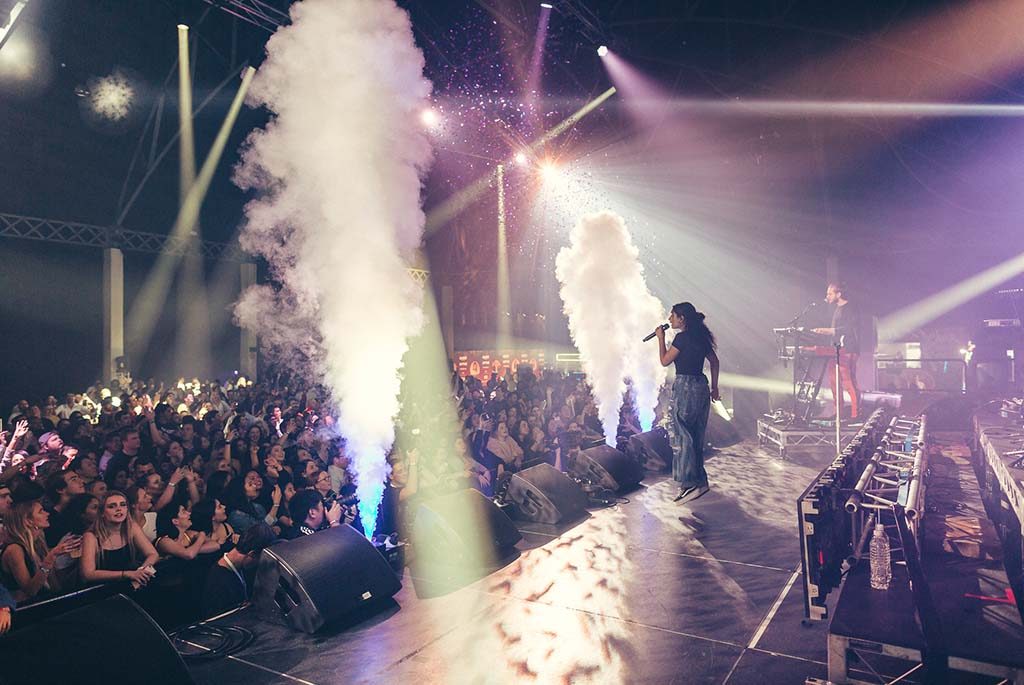
Image: Dara Munnis
You decided to write it all on your own. Why?
Two reasons. One, because it’s such a personal story, such a personal album, and it felt like it should’ve come 100 percent from me – so, that way, when you listen to it, you know it’s strictly from me and every word is me.
Then, also, because I’ve just always dreamt of being a songwriter, and a good songwriter. I have always wanted to say that I had at least one project that I did on my own. It’s my own little personal goal. And I think honestly now that I’ve done it and know that I can do it…I think I’m always going to do it this way.
Because you realise you’re capable, because you put so much pressure on yourself, especially when it’s a full project. You’re like, ‘Oh, can I do it?’ Then you realise it’s the same thing. I was meant to do it. I’m a songwriter. It’s what I do. If you look at it as expressing yourself rather than making an album on the clock, it’s just so much easier.
Was it a way of proving yourself? Taylor Swift did exactly the same thing for Speak Now. She decided to write the entire thing herself because she was sick of people being like, ‘Well, you can’t be writing all those songs yourself’.
Yeah, definitely, because I think when you’re a young woman…that has some success, people always think, ‘Okay, well, who does she have to thank for that? Who really is doing this?’
I just really wanted to prove it to myself and to everyone else who said that I am not a real artist or that I’m not capable, because I am.
There’s a line on ‘Growing Pains’ that I really liked. It’s “Looks like Ms. Know-It-All can’t take her own advice.” What advice was that referring to?
Well, a lot of it was the advice that I gave in my other songs on my previous album — like self-love or things like that. I had a lot of my fans coming up to me telling me, like, ‘You helped me love myself’.
That was amazing and beautiful, but then I’d go back home and I’d be like, ‘I’m helping these people love themselves, but then sometimes I’ll look at myself in the mirror and be like, ‘I don’t like myself.’ I feel like I’m not taking my own advice. I’m singing these songs to all these other people, but I wasn’t giving myself the time to take care of myself.
In that sense, I just felt like I was preaching positivity, but sometimes I would just feel so pessimistic about myself and about my life. I felt like I was being hypocritical in a sense, which is obviously not the case — because everybody struggles and no-one’s perfect, but sometimes you feel like, wow, I’m not taking my own advice at all.
Were there any times over the last album cycle and tour when you were like, ‘I regret this career. I’m not cut out for this at all’?
All the time. Even now, there are days where I’m like, ‘You guys, the universe picked the wrong person. I don’t know why it’s me. I’m not capable. I’m going to collapse. I’m going to fail’.
Because a part of me is cut out for it and I do think I’m meant for this — obviously, otherwise I wouldn’t be here — but there’s this other side of me that’s just like, “I’m just meant to be a songwriter and I’m not meant for all this attention. I don’t know if I can handle it”.
It’s just not in my nature. It’s not my personality to be comfortable in front of a crowd. My first song was about that. ‘Here’ was about being at a party I was uncomfortable at – so this whole kind of career sometimes feels like a giant party that I’m uncomfortable in.
It’s not until I make something I’m proud of or I’m on stage singing and feeling so comfortable and looking out and seeing how many people I’m affecting that I realise that I am meant for this and I don’t know if I would want to do anything else.
If you get down to the core of what music is, it’s to help people and to help other people express themselves. If I think about that, it becomes a lot easier and more worth it.
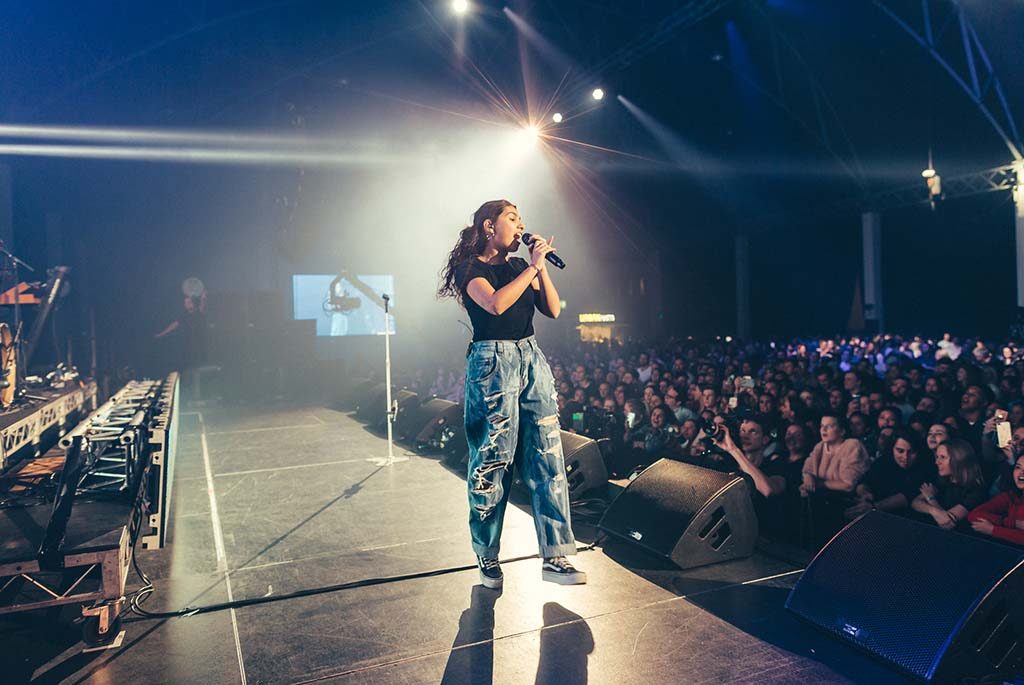
Image: Dara Munnis
There’s another line I really like: ‘A short leash and a short fuse don’t match up’. The music industry is such a massive machine, and as a massive pop star it’s often hard to move with a lot of freedom. Has it been hard for you growing up in that?
A little bit. Or, actually, a lot.
I wouldn’t say I’m constricted totally, or a prisoner to the industry or anything like that, but my life is very much planned. I know what I’m going to be doing February of next year, or March of next year. When you have that in front of you it’s cool in a way, but then it’s also like, “Wow, this is my life”. You just get so consumed by it, every day. It’s kind of unsettling to know what I’m going to be doing every single day.
So, in that sense, it’s not as easy for me to just be like, “I need to go home”, or, “I’m going to go home. Bye, guys”, or, “I need a day”.
You can’t really do that because there’s so many people that rely on you for a living.
‘Growing Pains’ is a lot more introspective than a lot of the songs on Know-It-All. Is it scary to put those thoughts and feelings into the public and stand up on stage and be like, ‘This is what’s in my brain’?
The first album was so directed to the audience, I never went too deep into me. Now I’m saying “I” in my songs a lot more and I’m really opening up in a way that I haven’t before. [It’s] kind of scary because people all of a sudden know what’s in your brain and what you think about at night, which is a very naked thing to feel.
I think it’s important and it’s necessary for me, and also for anyone else who is going through those things. Because if an artist doesn’t really talk about what they’re really going through and the truth, then people might feel like they’re crazy or they’re alone.
Maybe it’s not until I say it that someone can click with me and be like, “There’s someone in the world that is thinking those things, too”. That’s why I do it. That’s why I open up and that’s why I put these songs out, because I could easily just write them and never put them out. Then it would be cathartic for me, but it would be of no use to anyone else.
The path you’ve taken with this album and the last one is kind of similar to Lorde. She became famous as a teenager, like you did, and then released Melodrama, which was a more introspective, basically asking, ‘What the fuck is my life?’ Do you feel an affinity with artists of a similar age to you?
Yeah, because I think as different as everyone’s experience is…so similar. When you take a young girl who has a normal life from a faraway place [and thrust her] into this life that is so 24/7 and so constant, I can see how the outcome would be the same and…how there’s a point where we’re all like, ‘What’s going on?
Everybody goes through that without being an artist or without being in this crazy life. There’s a period in our 20s where we have those quarter-life crises. Is that a word? The plural of crisis [laughs]. You’re just like, “Who am I? What’s going on?”
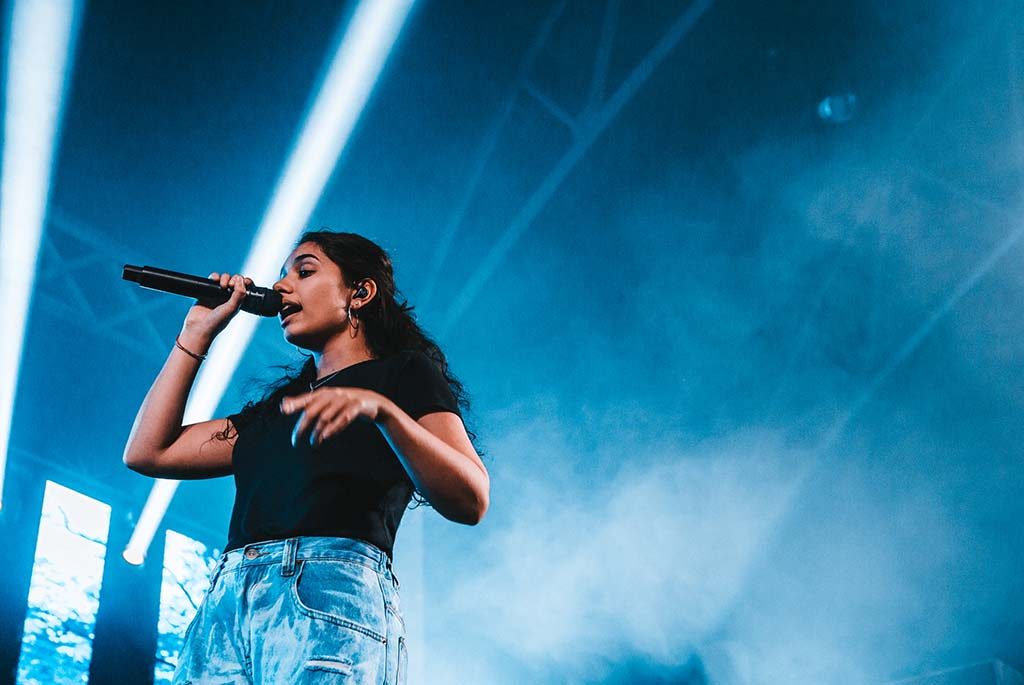
Image: Jess Gleeson
Did you come out of writing the album having cured your self-doubt? Did you manage to sort through what you were trying to work out?
It’s different every day. Some days I’ll feel like it’s so behind me and it’s so in hindsight, and then other days I’ll find myself in the thick of it again, which is, again, I think very similar to every human experience.
Some days feel like 10 steps forward, others feel like 10 back. I don’t know, it’s just life. I think the first step is being conscious of it and being conscious of what you’re feeling – which I think now I am, because before I wasn’t.
Now the next step is figuring out how to not feel that way.
What do you hope your fans take out of this record?
I think they’ll definitely get more insight into who I am, but that’s not what I want them to take away, necessarily. I don’t want this to be an album about me or about my struggles. I want it to be about everyone’s. If they can find pieces of themselves in my experiences I think that’s the goal for me.
I want them to be able to say, “This is an album about me and my life”.
Congratulations on your Grammy Award. The Grammys this year were pretty…interesting, for a lot of reasons. How did it feel to be in the centre of that gigantic whirlwind?
It was a little strange. Because I was the only woman…I think if it was any woman it would’ve been around them, but I just happened to be that one woman. Then, also because of the new artist argument, ‘Is she new? Is she not new?’ It was just kind of confusing.
Things like that and politics around things like that, I understand why they’re necessary, but I also think that they taint the innocence of someone’s dream, like my 10-year-old dream or another artist’s 10-year-old childhood dream of winning something like that — which was kind of unfortunate, because I always thought if I were to ever win something, it would just be great.
Then it happens to you and people are telling you that you took something from someone else or that you don’t deserve it. That was kind of hard. I’m not going to lie. I wish I wasn’t affected, but I was.
I think I was just in a vulnerable place already, but then that kind of happened. It messed with me. I understand why it’s necessary, though. I definitely shouldn’t have been the only woman up there, but I don’t think people should’ve said that I was the wrong woman to be up there. It’s like, if you’re a feminist, you should be a feminist for all women. That’s the point. You can’t just be like, “All women, but not you”.
I hope that, next year, we’ll see some more women recognised, because they deserve to be. There’s so many women doing amazing things and changing people’s lives and changing the way that music works.
—
(Lead image: Jess Gleeson)
—
‘Growing Pains’ is out now, buy and stream it here.
—
Jules LeFevre is Junkee’s Music Writer. Follow her on Twitter.